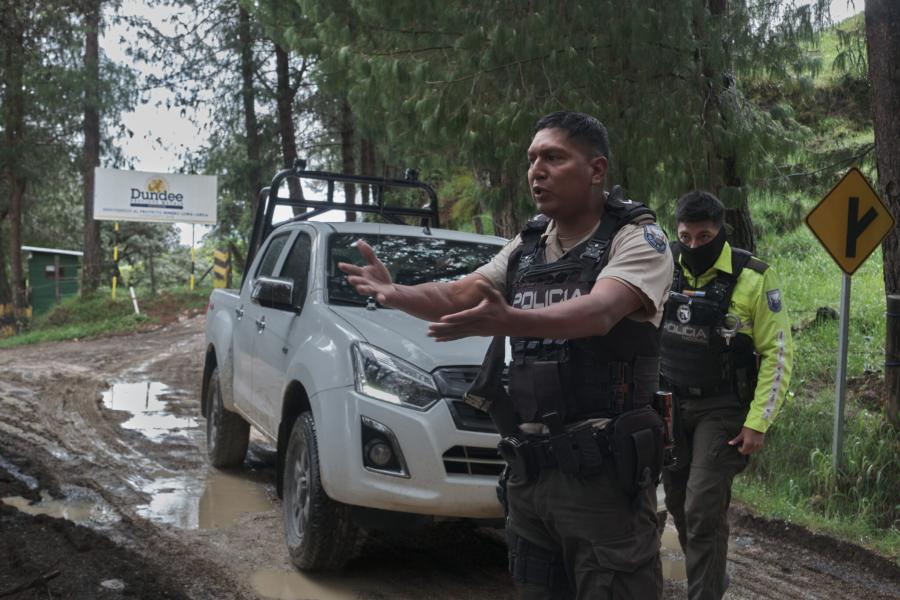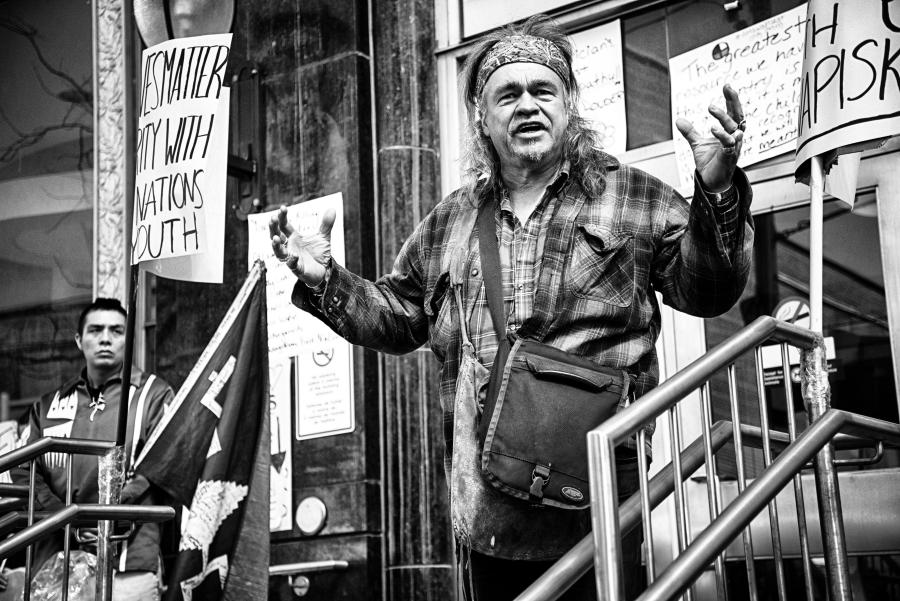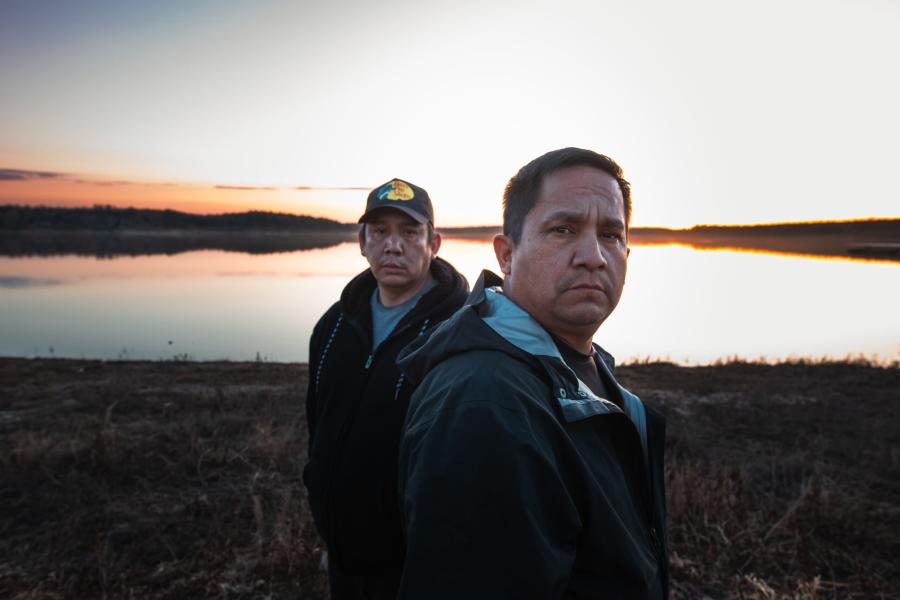
By Nati Garcia (Maya Mam, CS Staff)
In December 2019, the British Columbia Supreme Court issued an injunction to allow construction of the Coastal GasLink pipeline, which is intended to be 416 miles long, and to cut through 22,000 square kilometers of unceded Wet´suwet´en land. The injunction gave the Coastal GasLink pipeline unlimited access to the ancestral lands of the Wet´suwet´en, and was firmly rejected by the Wet´suwet´en people. On January 7, 2020, the Wet´suwet´en Hereditary Chiefs, the traditional form of government for the Wet´suwet´en Peoples, served the pipeline company with an eviction notice, effective immediately. Despite the Hereditary Chiefs’ opposition to the pipeline, the Wet´suwet´en elected band council—a form of Indigenous governance established by the Canadian government—signed an agreement to allow the pipeline to go forward.
In an effort to protect ancestral lands and prevent the construction of the pipeline, community members have established encampments such as the Unist’ot’en Camp, which was founded to re-establish traditional Indigenous governance systems and enact a Free, Prior and Informed Consent protocol for all activities on Unist’ot’en land. These encampments have consistently been targets of violence and intimidation by the Royal Canadian Mounted Police (RCMP). Molly Wickham (Wet´suwet´en), Supporting Chief in the Cas Yikh House of the Gidimt’en clan of the Wet´suwet´en Nation, spoke to us at Cultural Survival about her involvement and the importance of continuing to resist the construction of the Coastal GasLink pipeline.
Cultural Survival: How and when did you get involved in the struggle?
Molly Wickham: I hold the name Sleydo, which is the supporting chief name in the Cas Yikh House; that's Grizzly Bear house of the Gidimt´en clan of the Wet´suwet´en Nation. We have five clans within our Nation, and Gidimt´en is the clan that I belong to. I live in Lhudis Bin, which is the Cas Yikh territory where we have Gidimt´en checkpoint, which is the reoccupation site of an old village site on our territory. I'm the spokesperson for that reoccupation site, and I've been involved in this struggle for the defense of our lands, our homelands, and our waters for quite a number of years now. I'm a mother of three children, and I did a master's degree in Indigenous governance at the University of Victoria before I came home to my home territories after living away for quite a few years. My father's clan is Unist'ot'en. My late grandfather was from the area outside of Burns Lake, and my late grandmother is Gidimt´en. We follow our matrilineal line.
CS: Give us an overview of the situation on the ground right now. What progress has been made in the past year? What are the excessive forces being used against Indigenous land defenders?
MW: Currently, there are three different clans of the Nation that are reoccupying old village sites and their territory. There is the Unist'ot'en, which is our neighboring clan territory across the Wet´suwet´en from us. There is Cas Yikh up to the Gidimt´en, who have the reoccupation village site at Gidimt´en checkpoint, and then there is another reoccupation at Parrott Lake from the Laksamshu clan. I can speak only for Gidimt´en checkpoint, but there's been an ongoing resistance from all of the hereditary Chiefs in the clans for several years now. Most recently, there was a reoccupation at what we called Coyote Camp, which is the drill pad site where Coastal Gas plans to drill underneath our sacred headwaters with Widzan Kwa, also known as the Morice River.
In November 2021, there was a militarized raid against Coyote Camp and against Gidimt´en checkpoint at Kilometer 44 on the Morice Forest Service Road. Thirty arrests were made on unarmed Indigenous people and our supporters. Since that time, Coyote Camp was retaken about one month to the day after the raid—Cas Yikh retook Coyote Camp and reoccupied the drill pad site. When we got word that there was a militarized attack preparing to come onto the territories again, we decided to strategically retreat from the area to avoid arrests and the violence and destruction that they had brought to our territories in November.
Currently, Coastal GasLink has put up a metal gate to block us out of the territory. Our Dinï ze’ Woos, our head chief, or house group for Cas Yikh, is doing trapping in the area. So this fight is definitely far from over. Because of the militarized raids and all of the police presence on the territories, we've had to be really strategic about how the resistance carries on. What happened in November was traumatizing and horrific and really hard on everybody, myself included.
I was arrested and held for five days in a city [jail cell] with limited food and water and sanitation. I think it's important for people to know that our people are not here to be arrested. Our people are warriors that come to our territories to help us on the land. We want to protect those people because they are the people that are protecting the land and the water for us. So avoiding arrest is, at this time, given the amount of force and the amount of violence that they brought to our territories, a very important strategic move for us.
CS: Coastal GasLink has dropped charges against journalists who were arrested on Wet’suwet’en Territory in recent weeks. Can you comment on this?
MW: They had charged two journalists, and those journalists spent three or four days in jail, and then they were released. Coastal Gas dropped the charges against them and the conditions of their release, which was great. [But] everybody else still has conditions not to return to the territory and is still facing charges. That created a lot of challenges for people that are part of our community, even non-Wet´suwet´en people who were living in our communities in our reoccupation sites and supporting our Elders to be living out on the territory. Now those people are not allowed back on the territory, which is a huge violation of our Indigenous right to self-determine who can and cannot be on our lands. The courts and the police have taken that away from us and are dictating who can and cannot be on the territory.
CS: What is the importance of Wedzin Kwa?
MW: The Wedzin Kwa [are] our sacred headwaters, where all of our water comes from. Most of the Pacific salmon spawn in that area. All of our neighbors downstream rely on the salmon arriving into our territories and our waters to spawn. We have this intense responsibility as Cas Yikh to ensure that our waters are pristine enough for the salmon to continue their lifecycle. That responsibility weighs very heavy on all of us, on me particularly, because I live out in the territory. I live about an hour out on a logging road with my three children, my husband, and our two dogs; we live off the land. We are homeschooling our children. We raise our children according to the seasons, according to our teachings, our values...hunting, picking medicines and berries, and we drink the water from Widzin Kwa. We go to the water, to Widzin Kwa, to fill up buckets and cisterns. That is the water that we use to cook, to bathe, to clean with, to drink and nourish our bodies. Unist'ot'en does the same thing; everything else in our territory relies on that water as well. Down below from where the drill pad site is, we have a smokehouse. Our house Chief, Chief Woos, we built him a smokehouse there a couple of years ago, and that smokehouse has been filled with salmon from our river that has fed our people, that has been smoked and dried there. We have a sweat lodge and a ceremonial pit house there. Our water is so powerful and healing.
We floated down the river this summer. We brought our clan members and our Chiefs so that everybody could see the 1,000-year-old ancient spawning beds in the bottom of the river. We got out and swam in Morice Lake, where the river flows from, and the water is so clear and so clean. When you're floating down the river you can see the bottom the whole way. It's so pristine, it's so clear, it's glacial-fed, and you can actually see the spawning beds that have been dug into the gravel in the bottom of the river that are thousands of years old where the salmon have been spawning.
By drilling under the river, just the drilling itself—even if everything else goes right, if there are no explosions if they don't get the pipe stuck, which is a common problem—if everything goes right, the disturbance and the sediment alone from drilling underneath the river will destroy our ability to drink that water forever. The sediment alone could destroy the salmon spawning eggs. It could destroy the airflow underwater or underground water flow and oxygen that gets into the spawning grounds. All of those things are not being taken into consideration by people who support this project. These are risks that we are not willing to take. We know that it will destroy that for us. We have to be able to protect that for all of our future generations like my children who drink that water, rely on that water and rely on that food, and the salmon and all of the other animals that rely on that water.
CS: How are women at the forefront of this struggle?
MW: Almost all of the leadership on the ground in the Wet´suwet´en struggle are women. We have our house Chiefs, who are the speakers on behalf of our house groups, but the people that are actually on the ground confronting police, confronting canine units, and militarized CMP rifles, we are all women from our communities. We have a strong responsibility because we have children. In some cases, some of the women have grandchildren. We are all thinking about them and about our futures. We are the ones that are doing a lot of the work.
I see this not only in our community but in a lot of other communities, that Indigenous women are the ones that are actually on the ground facing off with the violence that is happening to us. I think that that's something that isn't being recognized to the degree that it should be. When the RCMP came in and they arrested those two journalists, there was a huge outcry. But the fact that our militarized RCMP came and attacked unarmed Indigenous women by using axes and saws to break down the homes that we were inside of before we were arrested, I don't think got enough attention. This is an ongoing problem of genocide. Our women are constantly being attacked and undervalued. We are not being viewed as important as two journalists were. I know there was outcry about the whole thing overall. But I don't think that people are understanding the connection between the violence against Indigenous women and the violence that's being waged in this fight against this pipeline.
CS: What advocacy are you currently pursuing besides direct action?
MW: We are going after investors to this project, the owners, the banks that are financing the construction of the Coastal Gas project. I believe that these people have a responsibility. A lot of these financiers have policies in place and ethical guidelines around what kinds of projects they are going to invest in and what kind of projects that they are going to own. We believe that they are violating their own policies and their own ethical guidelines either because they do not know about the harm that is being done by this project, or they do not care.
Either way, they have to be informed and they have to be held accountable for funding the genocide that's happening to our people and our land. So we're working very hard at ensuring that they are well aware of the impacts of this project on the Wet´suwet´en people and on the climate. This is not just a fight about this one pipeline; this is a fight about Indigenous sovereignty, it is a fight against the climate crisis. This is something that everybody should be concerned about because we know that insurmountable emissions [won’t be created] from this one project alone. This is a whole industry claiming to be a clean industry, but that is seriously harming the climate right now.
There is not enough power in so-called British Columbia to liquefy all the gas that they are planning to export through this pipeline to Kitamat and then overseas. They will have to liquefy all the fracked gas, which will come from northeastern British Columbia, and they're going to use energy from the site C dam to liquefy it. They also will have to burn the fracked gas in order to have enough energy to liquefy the gas to export it to Asian markets, so they will be burning fracked gas on our coast in order for this project to be successful.
CS: What can the international community do to help?
MW: Internationally, we've been making a lot of connections with other groups and other Nations that are struggling against the same companies. We can organize together against certain banks and financiers that are funding projects that are also destroying people's territories. We've been in those conversations over the last few years, finding those people to make those connections. We have to see the broader picture of what's happening in the world right now. I think that oftentimes the general public might not totally understand that this is a bigger issue than just this one pipeline or just this one project or just this one industry, that there are larger problems that are happening in the world and that they aren't going to stop until enough people force them to stop. I don't think that people are going to stop multibillion-dollar projects because they think it's morally wrong. People on the ground can force those things to happen, and that is what we need to be doing.
Direct action helps. Amplifying the messaging and collaborating on common enemies that are financing these things or that are working together on projects that affect more than one Nation are really helpful in amplifying the message so that more people understand the bigger picture and can work together to actually make a difference. All those things are important, from being on the ground directly, to campaigning against banks and investors, to talking to your family and friends and to other organizations. I think that this struggle has done a really good job at getting people together, organizing, and working together for a common goal.
CS: Is there anything else you would like to share?
MW: I think that it's important for people to know that the Wet´suwet´en still have our governance system in place. The names that we carry come with responsibilities. They come with specific jobs that we have to do to uphold our lands and our people. We're very grateful and lucky to still have those things. A lot of Nations have lost that, but we have been able to hold on to it thanks to the perseverance and sacrifices that our ancestors made. I think that it's a good example of how we can breathe life back into our governance and our jurisdiction on our territories, and that we have to make an example out of this for other Nations that are attempting to do the same thing. We have to work together as Nations to take back control over our lands and our people and our way of life so that we can end the tyranny that's happening all over in Indigenous communities.
I also want to say that we are so grateful for all of the media, for all of the people that have reached out, all of the organizations, every human being that has taken the time to come out to the Yintah. We would not be able to do this without all of the support, and every single day is overwhelming with the amount of love and support and prayers that people are providing for us to keep this struggle going, to be on the path to victory. Words cannot describe the gratitude that we have for every single person that has put hard work and sacrifice into helping us.
Resource links:
https://www.yintahaccess.com/news/wetsuwetenresistance
https://www.cbc.ca/news/canada/british-columbia/rcmp-wet-suwet-en-pipeline-resistance-1.6254245
https://thetyee.ca/News/2021/09/03/Wiping-Us-Off-Territory/
All photos: Campground of Cayote camp by @arvinoutside Jen, Media Coordinator.



